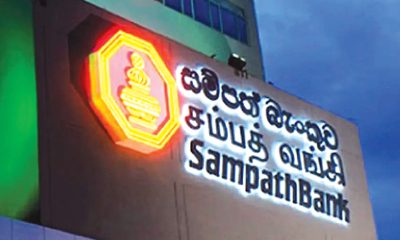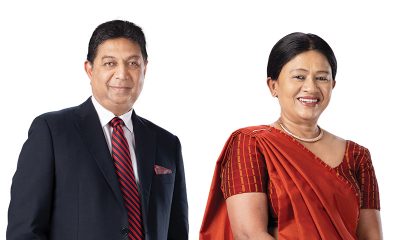Business
Sampath Bank hands over Pubbiliya Wewa, the 12th successful restoration project in its Wewata Jeewayak program
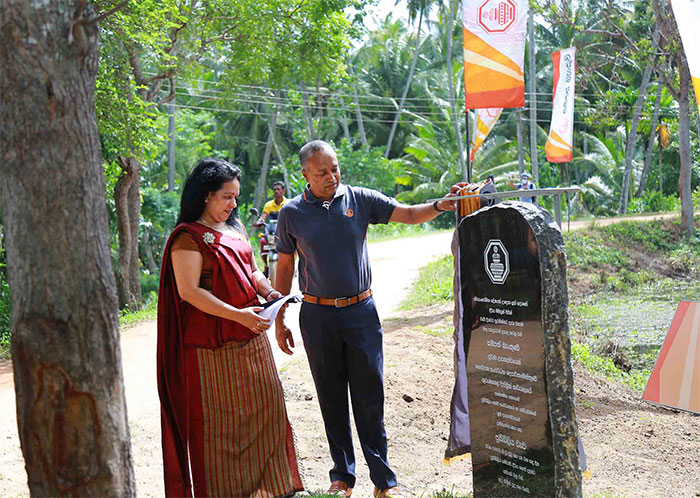
Sampath Bank recently handed over restored Pubbiliya Wewa, a 45-acre tank in Pubbiliya, Kurunegala District at a ceremony attended by bank officers, members of the executive committee of the local farmers association, villagers, and officials from the Department of Agrarian Development’s Kurunegala District Office. This project involved restoring the tank spill and removing layers of accumulated sludge that had built up over decades of neglect. Pubbiliya Wewa, located about six kilometers northeast of Kobeigane, will irrigate over 210 acres of prime paddy lands. Over 160 farming families, comprising of more than 500 men, women and children, stand to directly benefit. Additionally, the ripple effects of the restoration will bestow economic benefits on five neighboring villages as well.
The Pubbiliya Wewa Restoration Project is part of the ‘Wewata Jeewayak’ (Life to Tanks), Sampath Bank’s flagship Corporate Social Responsibility (CSR) initiative. Begun more than twenty years ago, ‘Wewata Jeewayak’ is a committed, coordinated effort to rebuild and restore the traditional irrigation network and thus ensure a dependable supply of water for dry zone farmers to cultivate their paddy lands and reap the harvests of both the Yala and Maha paddy seasons. ‘Wewata Jeewayak’ is congruent with what business schools call the triple bottom line. It’s a value system based on the belief that instead of focusing solely on their financial performance, firms should commit to measuring their social and environmental impact on the ‘Three Ps’- People, Planet and Profit as well. It’s aligned with the United Nations Sustainable Development Goals (UNSDGs). In a nutshell, to improve the livelihood of the community (People), increase the water capacity of the tank (Planet), enrich the surrounding ecosystem (Planet), contribute to the national GDP (Profit), and empowering local agricultural entrepreneurs (People and Profit).
At the handing-over ceremony, Sampath Bank officers thanked the Pubbiliya Govi Sanvidhanaya (farmers’ association) for their wholehearted contribution. The Bank also thanked the representatives of the Department of Agrarian Development’s Kurunegala District Office for their invaluable technical support.
“Restoring the Dry Zone’s water-dependent ecosystems mean that farmers can cultivate paddy in both the Yala and Maha seasons, and contribute to the nation’s food security. This is very much a topic of concern in the present day. Tank restoration enriches the country’s biodiversity profile as well, when regional fauna and flora start flourishing again. So, the benefits are truly multifold”, said Ajantha De Vas Gunasekera, Executive Director / Chief Financial Officer, Sampath Bank PLC.
“It’s very gratifying to see a bank taking an interest in the agricultural economy, and getting actively involved in restoring ancient tanks,” said Kiribandiya, President of the Pubbiliya Govi Sanvidanaya. “Speaking as farmers, we understand how important it is to make the country self-sufficient in food. Committed long-term efforts such as Sampath Bank’s Wewata Jeewayak program will help us accomplish that goal.”
Despite the obstacles currently faced by the banking sector in Sri Lanka, Sampath Bank has successfully maintained all its capital ratios well above regulatory requirements throughout Q1 2022. All the while, Sampath Bank has implemented all government-led moratorium schemes for eligible customer segments affected by the pandemic. The Bank’s digitalization strategy has also continued to prove its worth during these trying times by securing a more accessible and safer banking experience for customers.
Sampath Bank is a 100% local bank that has deeply rooted itself in the lives of the people of Sri Lanka. Established in 1987, the bank has become a state-of-the-art financial institution that continues to be a market leader today thanks to its constant innovation and customer focused approach to business. It has introduced many firsts to the Sri Lankan banking sector including introducing ATMs to Sri Lanka, extended banking hours, slip-less banking and adaptation of block-chain technology to name a few. As part of its visionary 2022 approach, the bank is steadily transforming itself into a ‘tech company engaged in banking,’ from the traditional approach of a bank adopting technology.
Business
CEAT Kelani reaffirmed by CPM as one of Lanka’s best-managed companies

CEAT Kelani Holdings has been adjudged the best-managed tyre manufacturing company in Sri Lanka and reaffirmed as one of the top 20 companies in the country for best management practices, by the Institute of Chartered Professional Managers (CPM) Sri Lanka.
The company received the Category Award in the ‘Tyre, Rubber, Metal & Wood Furniture’ sector at the 2025 edition of CPM’s ‘Best Management Practices Company Awards’ in addition to the Top 20 award presented at the awards gala. This is the second consecutive year that CEAT Kelani was recognised as one of the best managed companies in Sri Lanka.
The CPM awards honour the best practices in management in terms of leadership, policies and strategies, people management, partnerships & resources, processes and performance.
“Awards of this nature will encourage us to strive for even greater heights in management practices, adopting global best practices in aligning strategic direction with a people-centric approach,” CEAT Kelani Managing Director Ravi Dadlani said. “We have already shattered the stereotype for large-scale manufacturing operations and are considered a case study for a successful privatisation of a state-owned enterprise, with unprecedented achievements in productivity, product development, deployment of new technology, research and development, market leadership, sustainability and good corporate citizenship.”
He said CEAT Kelani has transformed from an “inside-out” company to an “outside-in” organisation, placing customer and market centricity at the core of everything it does. This shift is reinforced through regular market visits by employees at all levels, including management, shop floor staff, and all business functions.
One of the highlights of the year assessed for the CPM awards was the launch of a comprehensive strategic marketing campaign aimed at enhancing brand premiumisation, increasing brand consideration and sales, focusing on leveraging CEAT car radials tyres’ positioning as German engineered tyres that deliver the most controlled and comfortable driving experience on Sri Lankan roads.
CEAT Kelani also significantly increased its support to Sri Lanka’s burgeoning vehicle assembly industry by developing high-performance Original Equipment (OEM) Tyres for a wide range of locally assembled vehicles, including cars, SUVs, motorcycles, scooters, and commercial vehicles. This initiative boosts competitiveness, creates jobs, and fosters economic growth. Through OEM projects, CEAT enhances its manufacturing capabilities, aligns with global quality standards, and tailors products to meet local needs.
Business
Optimism among Swedish companies working with Sri Lanka
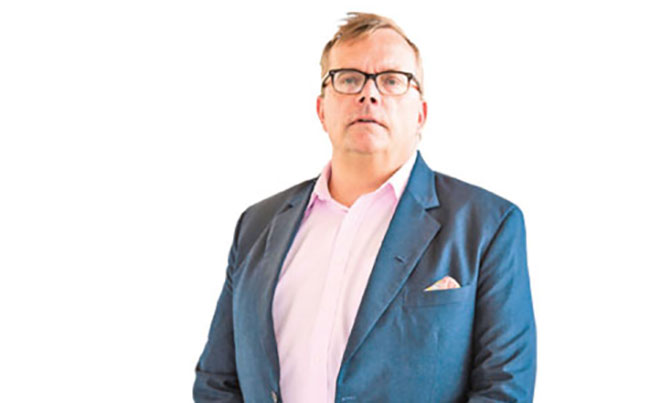
Growth in the last five years, growth in 2024 and optimism for 2025. These are some of the key findings from the Sweden-Sri Lanka Business Council’s (SSLBC) 2025 Membership Survey, a news release from the organization said last week.
“The results are also a reflection of the increasing interest for Sri Lanka among Swedish companies. In two years, the number of members of SSLBC has grown from 75 to 100.
– The results are encouraging. Our members have developed their business relations with Sri Lanka in recent years. We are also noticing a general increase in interest from the Swedish business community for Sri Lanka. The results should also be seen in the light of Sri Lanka’s fiscal recovery
since 2022. At the same time, the visa issue continues to be raised by our members, both for business visits and conferences or fairs. Action is needed by the relevant authorities,” says Leif I Ohlson, Secretary General Sweden-Sri Lanka Business Council.
The member survey was conducted in February 2025. In total, it was answered by 50% of the members. Respondents include companies active in IT, manufacturing, trade, food and tourism. Three out of four have been operating in or with Sri Lanka for at least three years. The number of members
of SSLBC have grown in the last two years, from 75 to 100.
Nearly six in ten say their business in or with Sri Lanka has grown in the last five years. A similar proportion have experienced growth in 2024. There is also strong confidence in the development of the business environment in Sri Lanka in 2025. Seven out of ten believe in a positive development, compared to one in four in 2023 when the survey was last conducted, and the effects of the fiscal crisis in 2022 were still clearly visible. Optimism is also strong among members for their own business in 2025. More than six in ten expect their activities in or with Sri Lanka to develop positively this year.
Members were also asked to rank the issues that are most important to them in 2025. In total, seven areas were ranked (the figure shown is the combined result of ‘most important’, ‘second most important’ and ‘third most important’:
1. Availability of skilled labor (74%)
2. Clear and predictable import/export rules (47%)
3. Financing (44%)
4. Flight connections (37%)
5. Stable payment flows (35%)
6. Positive image of Sri Lanka in Swedish media (34%)
7. Transportation (29%)
– Sri Lanka has a highly educated workforce, not least in the IT sector. The salary situation is also favorable. This is a reason for many Swedish IT companies to establish themselves in the country. At the same time, only a few members have received support or assistance from Swedish trade promotion agencies or their Sri Lankan counterparts in establishing or developing operations. There is more to be done here and over the past year we have seen a greater commitment from them, which will certainly be visible in future surveys.
However, presence on site and the opportunity to share their experiences with other entrepreneurs is most important. Here SSLBC plays an important role with our many years of experience and continuity, says Leif I Ohlson.
About Sweden-Sri Lanka Business Council
Sweden-Sri Lanka Business Council was established in 2006 and has 100 members. Members are active in IT, manufacturing, consumer goods and food, and tourism. Together, the members create over 2,000 jobs in Sri Lanka, directly and indirectly.
The Sweden-Sri Lanka Business Council is a membership organization that exists to create member value through knowledge sharing, expertise, professional networking and by promoting members’ issues. Sweden-Sri Lanka Business Council strives to facilitate and develop relationships between trade organizations, business intermediaries and companies in both countries to stimulate business and trade between Sweden and Sri Lanka.
(Contact details: Leif I Ohlson, Secretary General Sweden-Sri Lanka Business Council sec.gen@sslbc.se)
Business
Russel’s Wellness unveils a new era of Ceylon tea
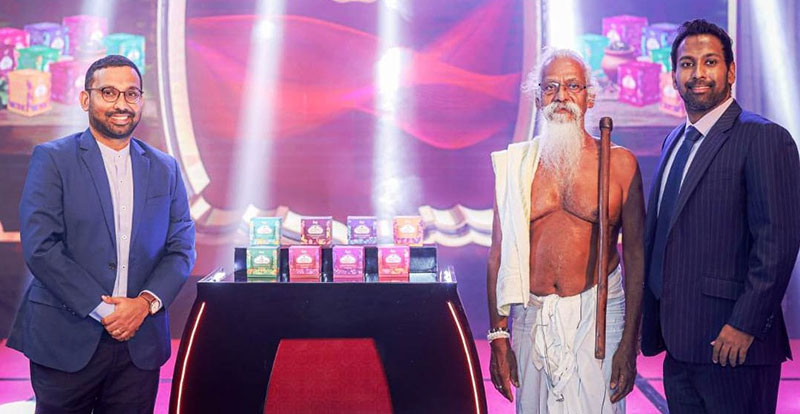
Russel’s Wellness recently launched an extensive range of wellness teas in five distinctive categories, aimed at offering a unique wellness experience to the world. This exclusive event was held at Amari Colombo on 22nd March 2025, with the participation of distinguished guests from various sectors in Sri Lanka. Russel’s Wellness is a subsidiary of Russel’s Group, a leading tea services and catering company in Sri Lanka, with over 35 years of experience in the industry and serving nearly 35,000 cups of teas everyday. Spearheaded by Mr. Russel Perera, Founder/Chairman of Russel’s Group, and Mr. Jehan Perera, Director – Strategy at Russel’s Group, Russel’s Wellness came to life with the objective of entering the export market.
This occasion was graced by Nishantha Jayasooriya, Director and CEO at Richlife Dairies and Shaw Wallace Ceylon Limited, and Director at Renuka Foods PLC as the Chief Guest; Indumini Kodikara, Director – Export Services, Export Development of Sri Lanka as the Guest of Honour; and Uruwarige Wannila Aththo, Chief of the Dambana indigenous people village as the Special Guest.
-
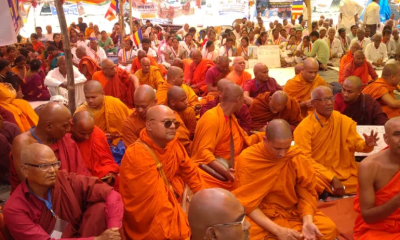
 Foreign News6 days ago
Foreign News6 days agoBuddhism’s holiest site erupts in protests over Hindu ‘control’ of shrine
-

 Features4 days ago
Features4 days agoCelebrating 25 Years of Excellence: The Silver Jubilee of SLIIT – PART I
-

 Editorial6 days ago
Editorial6 days agoWhen tractors become cars!
-

 Business2 days ago
Business2 days agoAIA Higher Education Scholarships Programme celebrating 30-year journey
-

 Business4 days ago
Business4 days agoCEB calls for proposals to develop two 50MW wind farm facilities in Mullikulam
-

 Features4 days ago
Features4 days agoNotes from AKD’s Textbook
-
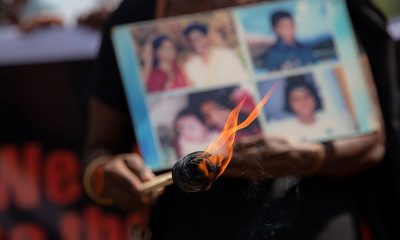
 Features6 days ago
Features6 days agoPolitics of Enforced Disappearances in Sri Lanka
-

 News1 day ago
News1 day agoGnanasara Thera urged to reveal masterminds behind Easter Sunday terror attacks


